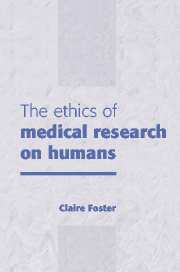Book contents
- Frontmatter
- Contents
- Foreword by Professor Sir David Weatherall
- Acknowledgements
- 1 An introduction to the ethical issues
- 2 Goal-based morality: scientific rigour in research
- 3 Duty-based morality: acting in the research subjects' best interests
- 4 Right-based morality: respecting the autonomy of research participants
- 5 From principles to practice
- 6 Case studies of goal-based issues
- 7 Case studies of duty-based issues
- 8 Case studies of right-based issues
- 9 A framework for ethical review: researchers, research ethics committees, and moral responsibility
- References
- Index
Foreword by Professor Sir David Weatherall
Published online by Cambridge University Press: 15 August 2009
- Frontmatter
- Contents
- Foreword by Professor Sir David Weatherall
- Acknowledgements
- 1 An introduction to the ethical issues
- 2 Goal-based morality: scientific rigour in research
- 3 Duty-based morality: acting in the research subjects' best interests
- 4 Right-based morality: respecting the autonomy of research participants
- 5 From principles to practice
- 6 Case studies of goal-based issues
- 7 Case studies of duty-based issues
- 8 Case studies of right-based issues
- 9 A framework for ethical review: researchers, research ethics committees, and moral responsibility
- References
- Index
Summary
A few weeks ago I was sitting at my desk, when there was a knock at the door and two characters walked in who bore an uncanny resemblance to two parking meter attendants with whom I had had a mild altercation while parking my car earlier in the day. ‘We are carrying out an organ inspection’ one of them said, ‘we have to look through your office to see if you are hoarding any human tissues or related material’. After they had left, empty handed I hasten to add, I mused on how close we are to Aldous Huxley's Brave New World and pondered on the extent to which we, the doctors, have brought all this on ourselves by centuries of insensitivity to the feelings of society.
In the UK, the last few years have seen an endless attack on the medical profession: clinical incompetence; abysmal communication; the storage of children's organs for medical research without permission from their parents; and so much more. All this has brought the inevitable short-term, knee-jerk reactions from Government, and the profession is likely to come under increasingly close scrutiny and bureaucratic regulation. This is happening at a time when we are about to enter one of the most exciting but complex periods of medical research. As the fall-out from the human genome project is applied to clinical research and practice it will open up a whole series of new ethical dilemmas and will undoubtedly raise many new concerns about research on human beings.
- Type
- Chapter
- Information
- The Ethics of Medical Research on Humans , pp. xi - xiiPublisher: Cambridge University PressPrint publication year: 2001



